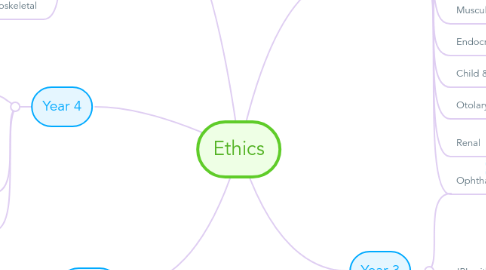Ethics
por Dundee Medicine


1. Year 1
1.1. Initial lectures introduce the origins and scope of medical ethics, as well as outlining its importance to the practice of medicine.
1.2. Principles
1.2.1. (L) Introduction
1.3. Musculoskeletal
1.3.1. (L) Moral values, ethical theories and stereotyping
2. Year 4
2.1. Students are prepared for ethical challenges in clinical practice in a special session during the Transition block at the beginning of the academic year.
2.2. Transition
2.2.1. Practicing taking consent and knowing how to raise concerns
2.3. Ethics observed – Open revision sessions
3. Year 5
3.1. Revision sessions and submission of a compulsory Ethics Case Discussion.
3.2. Ethics observed - Open revision sessions
3.3. Case discussions on ethics (1.500 words)
4. Year 2
4.1. Ethical topics are discussed as part of all blocks, including consent, confidentiality, treatment of children and young patients, research ethics, end-of-life ethical care and tissue donation.
4.2. IPL with Nursing and Dentistry
4.3. Dermatology
4.3.1. (ID) Research ethics
4.4. Musculoskeletal
4.4.1. (L) Basic ethical issues in medicine
4.5. Endocrinology
4.5.1. (L+ID) Patients’ consent
4.6. Child & Family
4.6.1. (L) Treating children and young people
4.7. Otolaryngology
4.7.1. (ID+SG) Confidentiality and privacy
4.8. Renal
4.8.1. End-of-life care and tissue donation (group debate led by students)
4.9. Ophthalmology
4.9.1. (L) Tissue donation and end-of-life care
5. Year 3
5.1. More advanced topics are discussed, such as treatment of patients with limited or no capacity to consent, reproductive ethics and the ethics of healthcare resource allocation and limitation.
5.2. IPL with Nursing and Dentistry
5.3. Ageing
5.3.1. (SG) End-of-life care and consenting old patients
5.4. Psychiatry
5.4.1. (L) Treating adults with limited/no capacity to consent
5.5. Haematology
5.5.1. (SG) Justice, fairness and resource allocation – discussion in small groups
5.6. Reproduction
5.6.1. (L+SG) Reproductive ethics / Assisted reproduction

